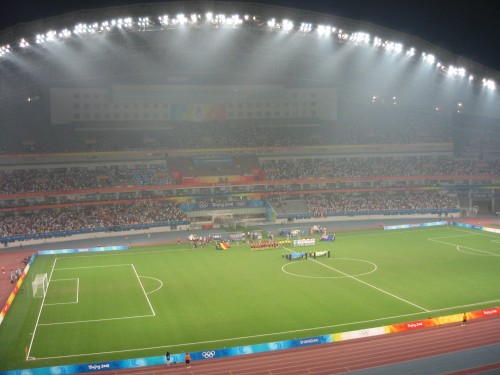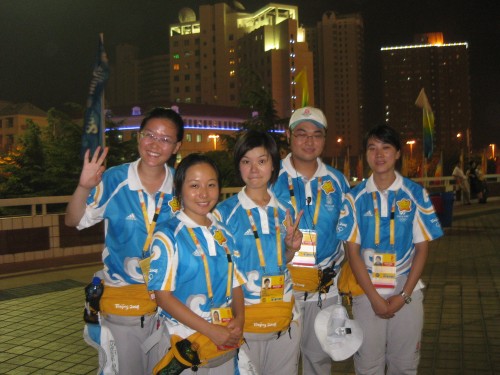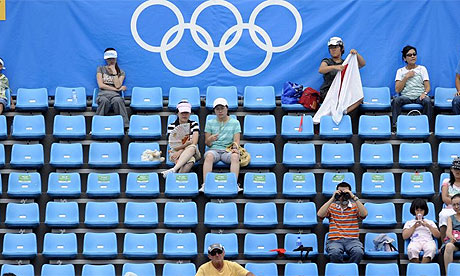This is one of the final posts on the Beijing Olympics Blog – the experiment is coming to an end, and to be honest, since getting back from China Bob has found it hard to summon up the time and enthusiasm to keep posting. To sign off it’s time to review the Beijing Olympics and Paralympics, identify lessons to be learnt for London 2012, and on a personal level to review the blogging experiment.
So, lessons for London 2012.
Don’t over-price
Despite the attention on empty seats and ticket touts it certainly seemed to Bob that most events were well attended by Chinese fans who were thrilled to be there. Bob watch Christine Ohuruogu win the 400m gold sat high in the stands next to a man from rural Shanxi province who had bought just one ticket and was determined to enjoy the night. The lack of Chinese athletes did not dampen his spirits, but prompted him to join Bob in cheering anyone British. He even had a stab at ‘God Save The Queen’!
Don’t over-price tickets in London, make international sport accessible for all.
Don’t get too obsessed by the medals table
This is something that the Beijing organisers were guilty of. There has been a great recognition of the advancement of Chinese elite sport leading up to the Olympics, and while this will undoubtedly inspire uptake of sport across the country most reports suggest that grass roots sport has not been promoted (see China Review 43 page 18. London 2012 should be able improving sports access in the UK, and the medal success should be a reflection of that, not a priority over it.
Some of the most controversial events in Beijing were related to poor judging and ineligible athletes in sports where it seemed the Chinese team were desperate to contribute to the country’s medal tally. The pressure on the people involved undermined the sporting achievements.
Let people gather
People who have attended both the Sydney and Beijing Olympics tend to agree on one thing; the atmosphere within the host city was better in the 2000 Games. This has a lot to do with the lack of spaces for fans from different countries to gather an celebrate in Beijing. Big screens were few and far between, sponsored events in the city were rare, and people without tickets were not allowed within the vicinity of the stadia. Understandably the Chinese authorities are not keen on large gatherings of people in Beijing, and this inhibited the Olympic spirit in Beijing.
Not everyone who attends the London Olympics will be able to get tickets for their favourite events but there is more to the Olympics than that. The London organisers should put together as many events as possible. Most essential of all: sites with big screens around the city where people can gather. Although London will probably have more security concerns than Beijing, there are alternatives to restricting freedoms.
Free transport for ticket-holders
Another of the success stories from the Beijing Games was the free transport. It’s not so much about saving money, but about making visitors feel welcome and facilitating a great experience. London’s transport is expensive, and this is a must for 2012.
Enable resale of tickets
Another of the many things the Chinese organisers did right was to turn a blind eye to ticket resale. Without this there would have been more empty seats, more disgruntled visitors, and less atmosphere in the stadia. However, Bob has no sympathy for ticket touts, who inflate the price of events, make it harder for real fans to get tickets legitimately and cream off profit without doing anything to earn it. Instead the London 2012 organisers must facilitate ticket resale and exchange at face value. A dedicated website and amnesty zones around the city should be set up to allow unwanted tickets to be passed on fairly.
Refreshments – not just a chance to make a buck
Sporting events have a tendency of serving terrible food for equally unpalatable prices, so it was refreshing in Beijing that the mark up was minimal (even if the food was still awful). London is an expensive place as it is, and there is a chance visitors will feel like money is being wrung out of them if food and drinks aren’t affordable.
In London the refreshments should be a chance to show-case good, healthy, local, and affordable delights. London can break the mould and make eating and drinking part of the experience rather than an unavoidable necessity for visitors. At least more choice than just McDonald’s!


